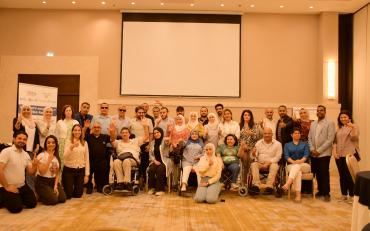From 29 July to 4 August 2023, the International Disability Alliance (IDA), CBM Global, and UNICEF under the Reference Group on Inclusion of Persons with Disabilities in Humanitarian Action (DRG), conducted the Bridge CRPD-SDGs Module 3 on CRPD Article 11— Situations of Risk and Humanitarian Emergencies. The training took place in Amman, Jordan, in partnership with Arab Organization of Persons with Disabilities (AOPD) and the International Disability and Development Consortium (IDDC) and is supported by United States Agency for International Development (USAID) and CBM International.
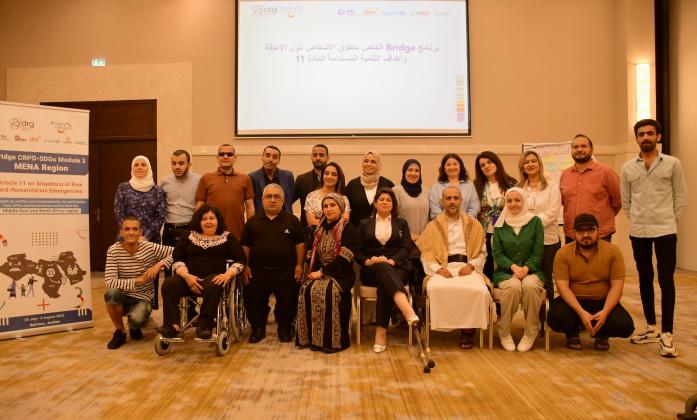
The training hosted 14 participants from OPDs (Organizations of Persons with Disabilities) and 8 participants from Humanitarian Organizations including UN Agencies, INGOs and NGOs from Middle East and North African region, particularly from Algeria, Egypt, Iraq, Jordan, Lebanon, Libya, Palestine, Syria, and Yemen. This is the second edition of the Module 3 since the pilot in Beirut, in 2019, and the second instalment of the Bridge CRPD-SDGs Module 3 of this particular project, after a training in Nepal for South Asian participants.
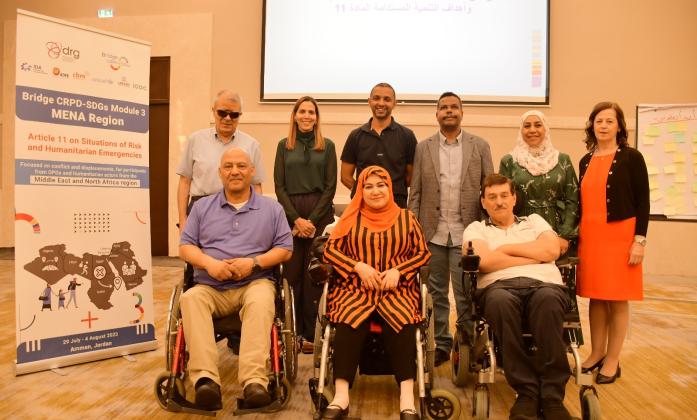
The facilitation team involved a diverse group of 9 facilitators representing both OPDs and humanitarian organizations from 7 countries: Egypt, Iraq, Jordan, Lebanon, Palestine, Sudan, and Tunisia. This training was designed in the framework of the Bridge CRPD-SDG Training Initiative, with an emphasis on in depth and interactive discussions while also being committed to inclusive facilitation.
A preparatory meeting for underrepresented groups of persons with disabilities including Deaf and deafblind participants as well as participants with psychosocial disabilities was organised a day prior to the event.
During the opening ceremony, Dr. Nawaf Kabbara, President of The Arab Organization of Persons with Disabilities (AOPD) and Member of IDA executive committee, drew attention to the importance of Bridge CRPD-SDGs on CRPD Article 11 and how it emphasizes the importance of inclusion of experiences of underrepresented groups in humanitarian response. He stressed on the importance of training a new generation of leaders to take forward the gains of the disability movement. The other speakers at the opening ceremony included Dr. Ahmed Ellawzi, Jordan's Coalition for Persons with Disabilities, Jahda Abou Khalil, AOPD and Ana Belen Arjona, UNHCR MENA.
During the discussion on day 1, OPD Participants shared the barriers to participation faced by women with psychosocial disabilities and Deaf persons in the rural context, facing restrictions in living in the community and from accessing mainstream education.
“In Jordan, we are eager to learn and maximize our impact on disability inclusion. We thank IDA for providing us with this valuable opportunity.” - Ana Belen Arjona, UNHCR MENA.
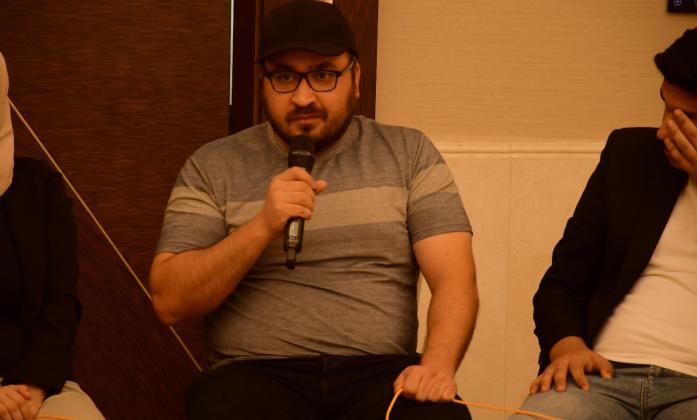 “The Bridge training has been managed perfectly, the venue is accessible, and the communication methods are inclusive. It's great to see a diverse group of participants, including persons with various types of disabilities. Thank you, IDA, for recognizing the importance of true inclusion." - Mr Shivan Jumaa Salih, Beautiful Mind Organization for People with Mental Difficulties, Iraq.
“The Bridge training has been managed perfectly, the venue is accessible, and the communication methods are inclusive. It's great to see a diverse group of participants, including persons with various types of disabilities. Thank you, IDA, for recognizing the importance of true inclusion." - Mr Shivan Jumaa Salih, Beautiful Mind Organization for People with Mental Difficulties, Iraq.
Amidst the discussions and enriching exchanges that took place during training, one session stood out as the participant favourite: concept note writing. This session not only engaged participants but also provided them with a practical opportunity to apply the knowledge and skills they had acquired in the preceding days on disability-inclusive humanitarian actions. Divided into groups, participants were tasked with developing a concept note aimed at securing funding for their initiatives.
For this, participants were handed a case study centred around a fictional crisis, along with comprehensive guidelines and a template for drafting their concept notes. Once the participants submitted their concept notes, they received valuable feedback from the facilitators. This feedback was instrumental in refining their proposals and ensuring they were well-prepared to transform their knowledge into action.
One of the participants, Samaher Fakhouri, United Nations Relief and Works Agency (UNRWA), Jordan, summed up the collective feedback of many: "This session helped me understand that as humanitarian actors, we need to do more to reach out to OPDs and work together to make our programs more inclusive and responsive."
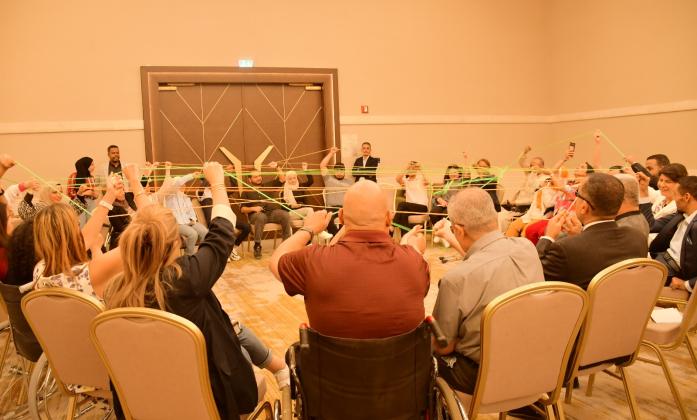
Following the enriching 6.5-day Bridge workshop, a distinct workshop centred around the Global Disability Summit (GDS) took place. This GDS workshop was organized by IDA and AOPD specifically for OPD participants. The discussion included GDS 2025, participating sectors, & commitments to facilitate a stronger voice for persons with disabilities in shaping topics of the Summit.
Additional resources:
1. Agenda in Word
2. List of participants in Word and PDF
